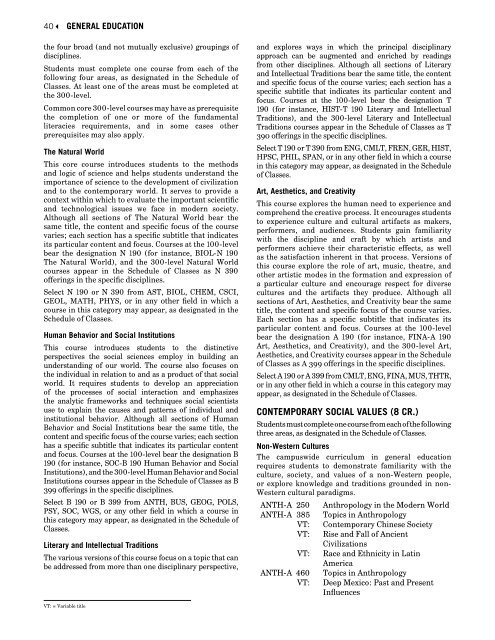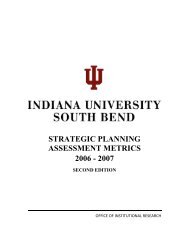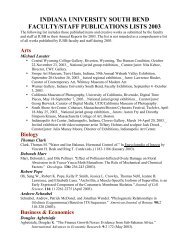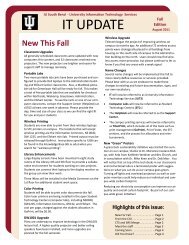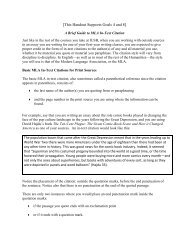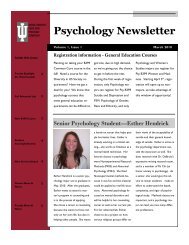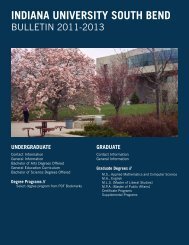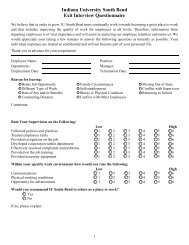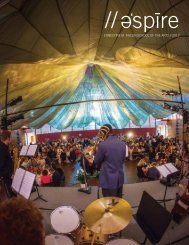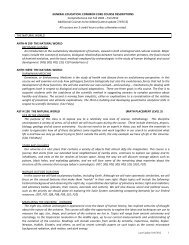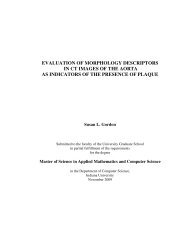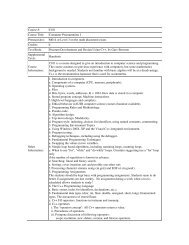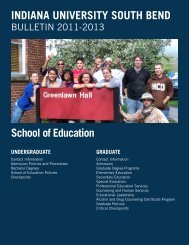Current version - Indiana University South Bend
Current version - Indiana University South Bend
Current version - Indiana University South Bend
You also want an ePaper? Increase the reach of your titles
YUMPU automatically turns print PDFs into web optimized ePapers that Google loves.
403 GENERAL EDUCATION<br />
the four broad (and not mutually exclusive) groupings of<br />
disciplines.<br />
Students must complete one course from each of the<br />
following four areas, as designated in the Schedule of<br />
Classes. At least one of the areas must be completed at<br />
the 300-level.<br />
Common core 300-level courses may have as prerequisite<br />
the completion of one or more of the fundamental<br />
literacies requirements, and in some cases other<br />
prerequisites may also apply.<br />
The Natural World<br />
This core course introduces students to the methods<br />
and logic of science and helps students understand the<br />
importance of science to the development of civilization<br />
and to the contemporary world. It serves to provide a<br />
context within which to evaluate the important scientific<br />
and technological issues we face in modern society.<br />
Although all sections of The Natural World bear the<br />
same title, the content and specific focus of the course<br />
varies; each section has a specific subtitle that indicates<br />
its particular content and focus. Courses at the 100-level<br />
bear the designation N 190 (for instance, BIOL-N 190<br />
The Natural World), and the 300-level Natural World<br />
courses appear in the Schedule of Classes as N 390<br />
offerings in the specific disciplines.<br />
Select N 190 or N 390 from AST, BIOL, CHEM, CSCI,<br />
GEOL, MATH, PHYS, or in any other field in which a<br />
course in this category may appear, as designated in the<br />
Schedule of Classes.<br />
Human Behavior and Social Institutions<br />
This course introduces students to the distinctive<br />
perspectives the social sciences employ in building an<br />
understanding of our world. The course also focuses on<br />
the individual in relation to and as a product of that social<br />
world. It requires students to develop an appreciation<br />
of the processes of social interaction and emphasizes<br />
the analytic frameworks and techniques social scientists<br />
use to explain the causes and patterns of individual and<br />
institutional behavior. Although all sections of Human<br />
Behavior and Social Institutions bear the same title, the<br />
content and specific focus of the course varies; each section<br />
has a specific subtitle that indicates its particular content<br />
and focus. Courses at the 100-level bear the designation B<br />
190 (for instance, SOC-B 190 Human Behavior and Social<br />
Institutions), and the 300-level Human Behavior and Social<br />
Institutions courses appear in the Schedule of Classes as B<br />
399 offerings in the specific disciplines.<br />
Select B 190 or B 399 from ANTH, BUS, GEOG, POLS,<br />
PSY, SOC, WGS, or any other field in which a course in<br />
this category may appear, as designated in the Schedule of<br />
Classes.<br />
Literary and Intellectual Traditions<br />
The various <strong>version</strong>s of this course focus on a topic that can<br />
be addressed from more than one disciplinary perspective,<br />
and explores ways in which the principal disciplinary<br />
approach can be augmented and enriched by readings<br />
from other disciplines. Although all sections of Literary<br />
and Intellectual Traditions bear the same title, the content<br />
and specific focus of the course varies; each section has a<br />
specific subtitle that indicates its particular content and<br />
focus. Courses at the 100-level bear the designation T<br />
190 (for instance, HIST-T 190 Literary and Intellectual<br />
Traditions), and the 300-level Literary and Intellectual<br />
Traditions courses appear in the Schedule of Classes as T<br />
390 offerings in the specific disciplines.<br />
Select T 190 or T 390 from ENG, CMLT, FREN, GER, HIST,<br />
HPSC, PHIL, SPAN, or in any other field in which a course<br />
in this category may appear, as designated in the Schedule<br />
of Classes.<br />
Art, Aesthetics, and Creativity<br />
This course explores the human need to experience and<br />
comprehend the creative process. It encourages students<br />
to experience culture and cultural artifacts as makers,<br />
performers, and audiences. Students gain familiarity<br />
with the discipline and craft by which artists and<br />
performers achieve their characteristic effects, as well<br />
as the satisfaction inherent in that process. Versions of<br />
this course explore the role of art, music, theatre, and<br />
other artistic modes in the formation and expression of<br />
a particular culture and encourage respect for diverse<br />
cultures and the artifacts they produce. Although all<br />
sections of Art, Aesthetics, and Creativity bear the same<br />
title, the content and specific focus of the course varies.<br />
Each section has a specific subtitle that indicates its<br />
particular content and focus. Courses at the 100-level<br />
bear the designation A 190 (for instance, FINA-A 190<br />
Art, Aesthetics, and Creativity), and the 300-level Art,<br />
Aesthetics, and Creativity courses appear in the Schedule<br />
of Classes as A 399 offerings in the specific disciplines.<br />
Select A 190 or A 399 from CMLT, ENG, FINA, MUS, THTR,<br />
or in any other field in which a course in this category may<br />
appear, as designated in the Schedule of Classes.<br />
Contemporary Social Values (8 cr.)<br />
Students must complete one course from each of the following<br />
three areas, as designated in the Schedule of Classes.<br />
Non-Western Cultures<br />
The campuswide curriculum in general education<br />
requires students to demonstrate familiarity with the<br />
culture, society, and values of a non-Western people,<br />
or explore knowledge and traditions grounded in non-<br />
Western cultural paradigms.<br />
ANTH-A 250 Anthropology in the Modern World<br />
ANTH-A 385 Topics in Anthropology<br />
VT: Contemporary Chinese Society<br />
VT: Rise and Fall of Ancient<br />
Civilizations<br />
VT: Race and Ethnicity in Latin<br />
America<br />
ANTH-A 460<br />
VT:<br />
Topics in Anthropology<br />
Deep Mexico: Past and Present<br />
Influences<br />
VT: = Variable title


